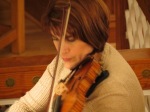Playing Mahler: My Response to Boston Terror
 With chaotic images from Boston still flashing through my mind, I sat with 79 other musicians in the NIH Philharmonia last night to tackle “Titan”–Mahler’s 1st symphony. The opening movement matched my mood—eerie, somber, haunting. In the violin section, we play a harmonic A for what seems like eons. But soon the lyrical melody kicks in and I’m reminded of the good in this world. And people like Mahler, who, instead of painstakingly assembling bombs to destroy lives, carefully built epic symphonies to last many lifetimes. The fact that Mahler was a Jew whose music was banned by the Nazis, gives me a special sense of triumph as we head into the joyful, Austrian melodies of the second movement. But the third movement forces me to pause and reflect on the lives that were taken, and those that will never be the same, as the somber bass plays “Frere Jacques” in a minor key. Soon, haunting melodies echo through the winds and strings, me along with them.
With chaotic images from Boston still flashing through my mind, I sat with 79 other musicians in the NIH Philharmonia last night to tackle “Titan”–Mahler’s 1st symphony. The opening movement matched my mood—eerie, somber, haunting. In the violin section, we play a harmonic A for what seems like eons. But soon the lyrical melody kicks in and I’m reminded of the good in this world. And people like Mahler, who, instead of painstakingly assembling bombs to destroy lives, carefully built epic symphonies to last many lifetimes. The fact that Mahler was a Jew whose music was banned by the Nazis, gives me a special sense of triumph as we head into the joyful, Austrian melodies of the second movement. But the third movement forces me to pause and reflect on the lives that were taken, and those that will never be the same, as the somber bass plays “Frere Jacques” in a minor key. Soon, haunting melodies echo through the winds and strings, me along with them.
Then the triumphant 4th movement is upon us. And I really mean Upon, since the notes bear down at a rapid-fire pace. There is fury and fire and the horrible images return to my mind; then just as suddenly, are swept away by one of the most achingly beautiful melodies in symphonic music. A yearning towards dawn. There is hope. Humanity has much to give.
The horns stand up for their triumphant finish. The hall is literally vibrating with sound. So magnificent, it’s actually hard to breathe. The final chords rebound and we all sit frozen, suspended in time.
Guess what, bomb-makers? Our creation is more powerful than your destruction. In the beginning there was The Word, or maybe it was The Note. We the music-makers were here before you. We will outlast you. And what you try to build cannot even fathom what we are already making together.
If you’re in the DC area and want to hear the NIH Phil play Mahler 1 on Saturday April 27th, details here.






Leave a Reply
Want to join the discussion?Feel free to contribute!